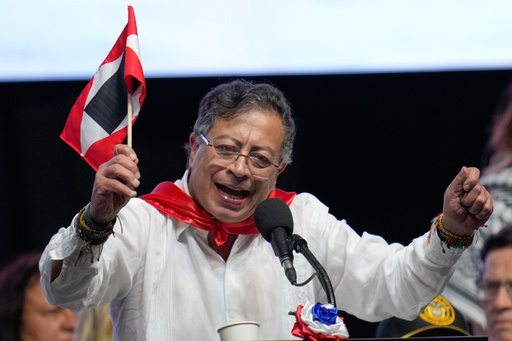US imposes sanctions on Colombia’s president and family members over drug trade allegations
News > Politics & Government News

Audio By Carbonatix
3:04 PM on Friday, October 24
By MATTHEW LEE and FATIMA HUSSEIN
WASHINGTON (AP) — The Trump administration imposed sanctions Friday on Colombian President Gustavo Petro, his family and a member of his government over accusations of involvement in the global drug trade, sharply escalating tensions with the leftist leader of one of the closest U.S. allies in South America.
The Treasury Department leveled the penalties against Petro; his wife, Veronica del Socorro Alcocer Garcia; his son, Nicolas Fernando Petro Burgos; and Colombian Interior Minister Armando Alberto Benedetti.
Petro “has allowed drug cartels to flourish and refused to stop this activity,” Treasury Secretary Scott Bessent said in a statement. “President Trump is taking strong action to protect our nation and make clear that we will not tolerate the trafficking of drugs into our nation.”
The move ramps up a growing clash between the Republican U.S. president and Colombia's first leftist leader, notably over deadly American strikes on alleged drug-carrying boats off South America.
This week, the Trump administration expanded its crackdown to the eastern Pacific Ocean, where much of the cocaine from the world’s largest producers, including Colombia, is smuggled. And in an escalation of military firepower in the region, the U.S. military is sending an aircraft carrier to the waters off South America, the Pentagon announced Friday.
After the sanctions were announced, Petro named an attorney he said will represent him in the U.S.
“Combating drug trafficking effectively for decades brings me this measure from the government of the society we helped so much to stop its use of cocaine,” Petro wrote on X. “Quite a paradox, but not one step back and never on our knees.”
The U.S. last month added Colombia, the top recipient of American assistance in the region, to a list of nations failing to cooperate in the drug war for the first time in almost 30 years.
Following that decision, the State Department is “slashing assistance for Colombia,” spokesman Tommy Pigott said on social media. U.S. aid is expected to be cut by at least 20%, or roughly $18 million, according to a U.S. official who spoke on condition of anonymity to offer details that have not been made public. The amount was an estimate and could change.
A State Department statement Friday did not specify the dollar amount affected.
The penalties were expected after Trump vowed to pull all payments to Colombia, which amounted to an estimated $230 million in the budget year that ended Sept. 30, a drop from recent years, when the aid exceeded $700 million, according to U.S. figures.
He also recently threatened to impose tariffs on its exports, referring to Petro on social media in recent days as “an illegal drug leader.”
“He’s a guy that is making a lot of drugs,” Trump told reporters in the Oval Office on Wednesday. “He better watch it, or we'll take very serious action against him and his country.”
After Trump accused him of having ties to drug trafficking, Petro on Wednesday said he would resort to the U.S. court system to defend himself.
“Against the calumnies that high-ranking officials have hurled at me on U.S. soil, I will defend myself judicially with American lawyers in the U.S. courts,” Petro wrote on X without naming Trump but citing a news report about his comments.
A day earlier, Petro’s anti-drug policy was the subject of a meeting between him and the U.S. chargé d’affaires in Colombia, John T. McNamara. McNamara also met with Foreign Minister Rosa Yolanda Villavicencio Mapy on Thursday.
Petro has repeatedly defended his policy, which moves away from a repressive approach and prioritizes reaching agreements with growers of coca leaf — the raw material for cocaine — to encourage them to switch to other crops, pursuing major drug lords and combating money laundering. He has said his government has achieved record cocaine seizures and questioned U.N. figures showing record coca leaf cultivation and cocaine production.
The amount of land dedicated to cultivating coca has almost tripled in the past decade to a record 253,000 hectares (625,000 acres) in 2023, according to the latest report available from the U.N. Office on Drugs and Crime. That is about triple the size of New York City.
The government of Venezuela, also a target of the Trump administration's military operations in the region, decried the sanctions against Petro, calling them “illegal, illegitimate, and neocolonial actions that violate international law and the Charter of the United Nations.”
The statement added that the U.S. measures seek to “promote the internal destabilization in Colombia” and praised Petro’s counter-narcotics strategy.
Many of the U.S. military strikes targeting traffickers accused of funneling drugs to the United States have hit boats the U.S. says have come from Venezuela or taken place in waters off the Venezuelan coast.
Petro has pushed back against the strikes, which have killed at least 43 people since they began early last month, and has repeatedly feuded with Trump this year.
Petro initially rejected U.S. military flights of deported migrants, leading Trump to threaten tariffs. The State Department said it would revoke Petro’s visa when he attended the U.N. General Assembly in New York because he told American soldiers to disobey Trump’s orders.
___
Lee reported from Jerusalem. Associated Press writers Regina Garcia Cano in Caracas, Venezuela, and Will Weissert in Washington contributed to this report.









